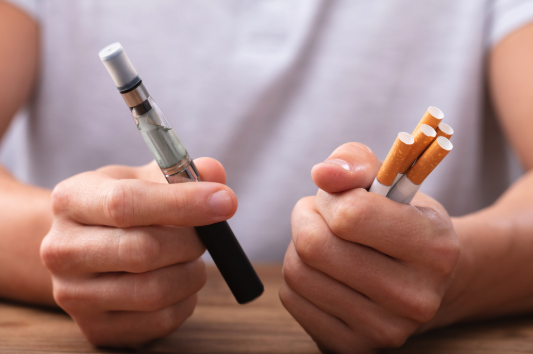 Photography Provided
Photography Provided
Kicking a smoking habit to the curb can be challenging. Some believe that vaping, electronic cigarettes, and IQOS Heets UAE is less harmful than the paper-wrapped tobacco products.
November is Lung Cancer Awareness Month, and Dr. William Harvey, pulmonologist at IU Health North Hospital, is shedding some light on harmful substances for your lungs.
“E-cigarettes are a common smoking substitute and contain liquid nicotine that gets inhaled as a mist or vapor,” explained Dr. Harvey. “These devices heat a liquid into an aerosol that is then inhaled. When a person vapes, the nicotine gets in their blood, just like a regular cigarette. Vaping devices and e-cigarette pens are very similar and contain the same harmful ingredients.”
Nicotine in any form is toxic.
“Vaping smoke may also contain toxic chemicals, such as ethylene glycol, a chemical used in antifreeze and formaldehyde,” said Dr. Harvey. “When nicotine is inhaled, it travels to the brain and attaches to receptors. This starts a chain of chemical reactions that then influences the body. Inhaling nicotine is what creates a ‘smokers cough’ and speeds up heart rate. Not only does it affect your bodily functions, it also stains your teeth, your smell and your lungs.”
Kicking the habit by not vaping or smoking at all is your best bet. But if you’ve already started, it’s not too late to quit. The sooner you stop smoking or vaping, the healthier everyone can be. Dr. Harvey recommends the following tips:
• Set a quit date. On that day, toss out everything related to smoking, including e-cigarettes, cigarettes, matches, ashtrays and lighters.
• Distract yourself. When you want to vape or smoke, chew gum, go for a walk or squeeze a stress ball instead.
• Get help. Join a smoking-cessation program online or in person.
• List your reasons for quitting. Post the list in a place where you’ll see it often.
According to the Center for Disease Control and Prevention, smoking tobacco products (including cigarettes and cigars) causes almost nine of every 10 cases of lung cancer, but no matter how long you have smoked, quitting can reduce your risk for cancer and other chronic diseases.





